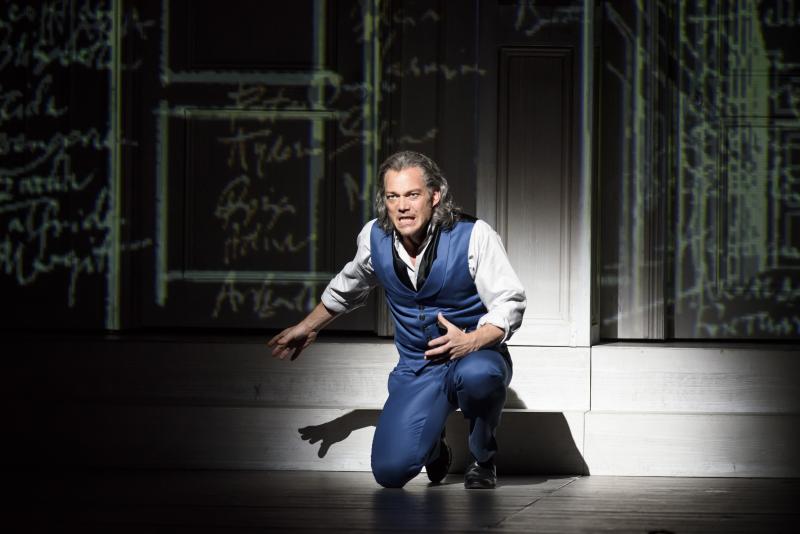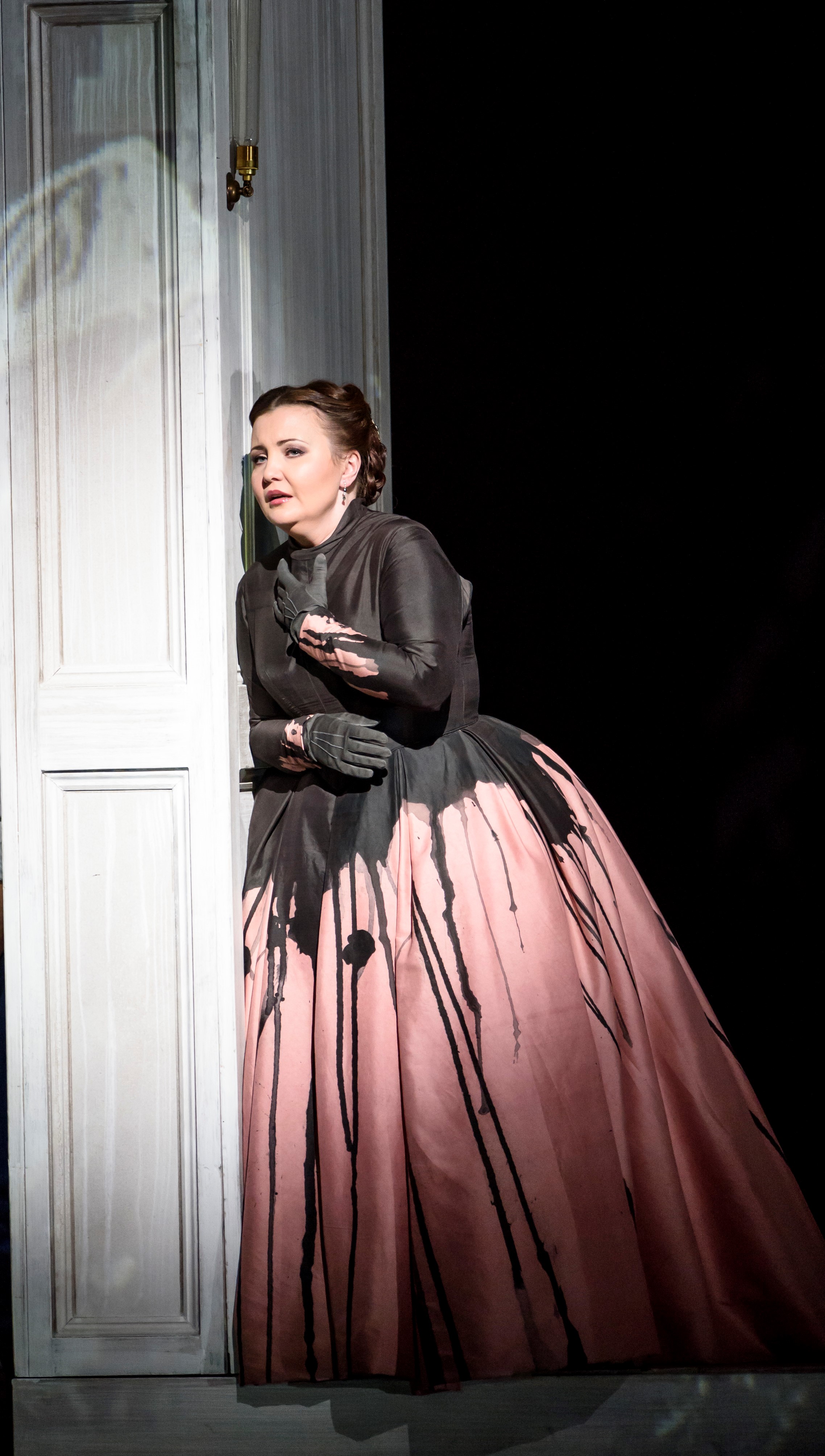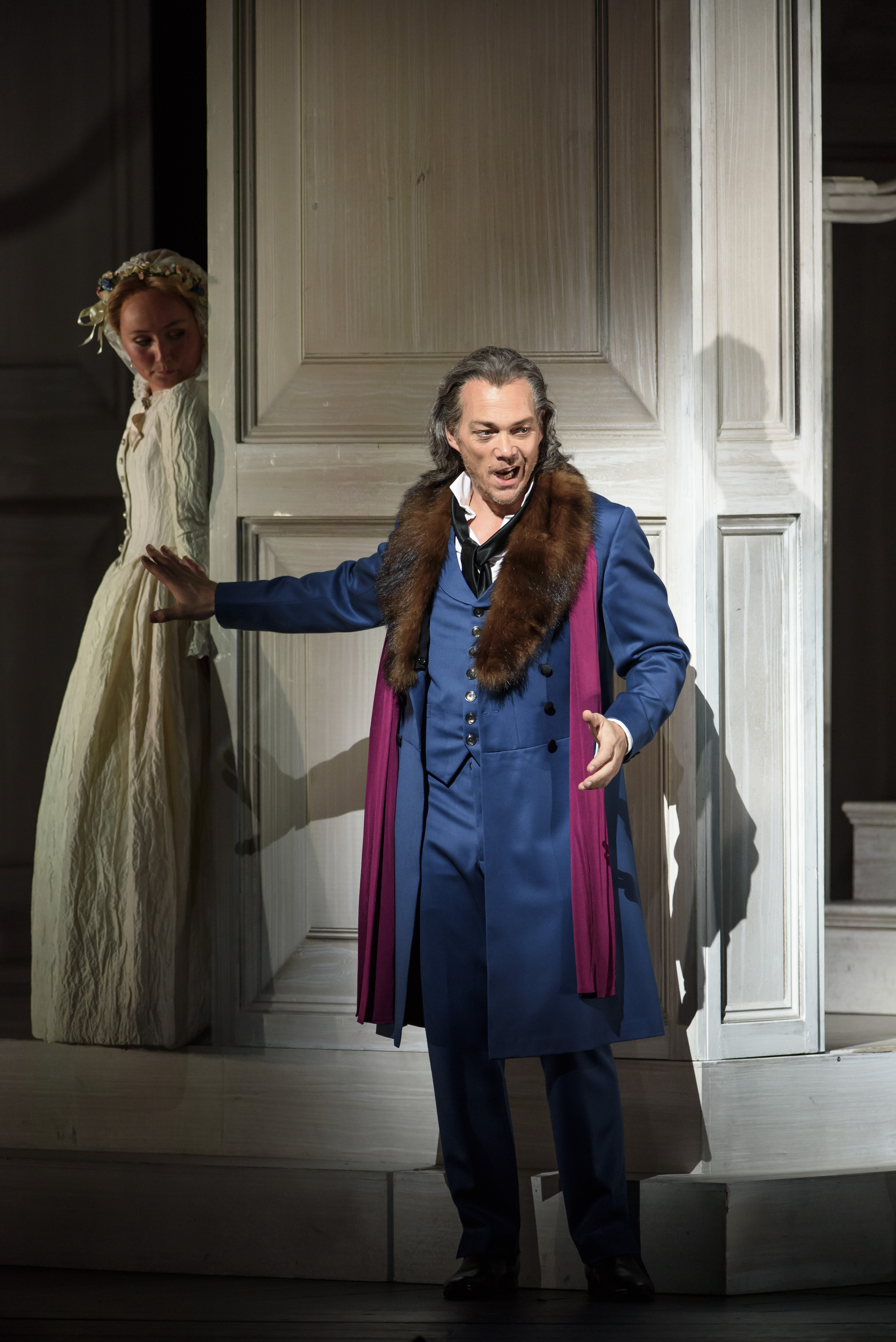Don Giovanni, Royal Opera | reviews, news & interviews
Don Giovanni, Royal Opera
Don Giovanni, Royal Opera
Concept still overpowers emotion in this strongly cast revival

2013 was the year that pop fans were forced to ponder the ethics of “Blurred Lines”. In 2014 classical fans followed suit, when Kasper Holten’s Royal Opera Don Giovanni unapologetically redrew the map of sexual boundaries. Suddenly Donna Anna was sneaking off for a quickie with the Don while her beloved laboriously declaimed “Dalla sua pace” – a willing partner (along with Elvira, Zerlina and all other women to hand) rather than a victim.
It’s clear that the director has been doing some thinking since the production’s first outing, but what’s also clear is that he’s lost some of the courage of his earlier convictions. The action is softened, smoothed out, and while that makes for a more palatable evening of sexual politics, it also rather pulls the rug from under Holten’s concept.
The big draw for this first revival is a starry cast, led by Christopher Maltman’s Don
This is the tale as told by the Don himself (because white, male sexual predators are notoriously under-represented in art). As the Overture’s quavers start fidgeting, so the classical façade begins to swarm with scrawled names – the famous list of Don Giovanni’s conquests – until the building is blackly covered. Physical architecture is overwritten with sketches (animated by Luke Halls’s video designs), until the revolving cube of a world is one entirely created by Giovanni. He even leaves ink blots on the women, a black stain spreading outwards on Donna Anna’s dress (Albina Shagimuratova, pictured below) as the action progresses.
 This basic framework remains, but within Es Devlin’s rotating world much has changed. Though still an enthusiastic participant in the opening scene, Anna no longer continues to pursue the Don. This raises questions that fail to be answered by the fairly traditional character development that follows. Zerlina too, much less lusty in Julia Lezhneva’s hands here than Elizabeth Watts’s last year, is altogether more conventional.
This basic framework remains, but within Es Devlin’s rotating world much has changed. Though still an enthusiastic participant in the opening scene, Anna no longer continues to pursue the Don. This raises questions that fail to be answered by the fairly traditional character development that follows. Zerlina too, much less lusty in Julia Lezhneva’s hands here than Elizabeth Watts’s last year, is altogether more conventional.
Most striking, however, is the rethink of the ending. Despite the confusion that came before it, this was a moment of shattering emotional rupture first time round. Stripped of his animated illusions and imaginings, the Don was left alone in the full glare of stage and house lights, suddenly thrust back to truth, while offstage the ensemble sang the sextet. It was elegant and satisfying in a way that few productions of this opera achieve. Traditionalists may prefer Holten’s current thinking, which follows the well-trodden route of cutting the final scene altogether, simply condemning Giovanni to an ever-shrinking spotlight and the curtain, but it makes little sense in the context of what comes before.
The big draw for this first revival is a starry cast, led by Christopher Maltman’s Don (pictured below with Lezhneva as Zerlina). Where Mariusz Kwiecien was all about sex, Maltman’s seductions are all about power, control. Cold violence in his actions meets heat in the voice, pouring itself into every crack in this familiar role. It’s a shame he and the rest of the cast don’t get more support from Alain Altinoglu’s pit. Veering all over the place in tempos that push and rush, and at one stage on opening night left the onstage band almost a beat behind, Altinoglu brings propulsion but little sensitivity, and the fortepiano still draws far too much attention to itself in the recits.
 Of the women, it’s Dorothea Röschmann’s Elvira that seizes this limp production by the balls – urgent, desperate, at times exquisitely unlovely, deploying every vocal colour and quirk of phrasing with intent. Albina Shagimuratova’s Donna Anna offers strong support, though noticeably tires towards the end, a more natural fit for this space than Julia Lezhneva (Zerlina). This voice is still – and may always be – a bit too small for Covent Garden, and especially in this low-lying role, her lack of power exposed in wayward tuning and unbalanced ensembles.
Of the women, it’s Dorothea Röschmann’s Elvira that seizes this limp production by the balls – urgent, desperate, at times exquisitely unlovely, deploying every vocal colour and quirk of phrasing with intent. Albina Shagimuratova’s Donna Anna offers strong support, though noticeably tires towards the end, a more natural fit for this space than Julia Lezhneva (Zerlina). This voice is still – and may always be – a bit too small for Covent Garden, and especially in this low-lying role, her lack of power exposed in wayward tuning and unbalanced ensembles.
While the rest of the cast were booked for Mozart, Rolando Villazón (Don Ottavio) spent Act I convinced he was doing bel canto, swooping and crooning his way through a troubled “Dalla sua pace”. This voice is still not a healthy one, and it's hard to see a future when everything above the stave retreats so far into the nose. Things improved with “Il Mio Tesoro”, and despite his issues, Villazón’s innate star quality does make this drip of a romantic lead into a more plausible lover than most.
If Holten’s Don Giovanni still isn’t precisely a success, then it does remain a fascinating failure. There is so much – too much – thought here, but plenty to provoke and engage. What’s lacking, however, is desire. Sex, here, is power, control, social currency. What it isn’t, and really needs to be, is sexy.
Add comment
The future of Arts Journalism
You can stop theartsdesk.com closing!
We urgently need financing to survive. Our fundraising drive has thus far raised £49,000 but we need to reach £100,000 or we will be forced to close. Please contribute here: https://gofund.me/c3f6033d
And if you can forward this information to anyone who might assist, we’d be grateful.

Subscribe to theartsdesk.com
Thank you for continuing to read our work on theartsdesk.com. For unlimited access to every article in its entirety, including our archive of more than 15,000 pieces, we're asking for £5 per month or £40 per year. We feel it's a very good deal, and hope you do too.
To take a subscription now simply click here.
And if you're looking for that extra gift for a friend or family member, why not treat them to a theartsdesk.com gift subscription?
more Opera
 La bohème, Opera North review - still young at 32
Love and separation, ecstasy and heartbreak, in masterfully updated Puccini
La bohème, Opera North review - still young at 32
Love and separation, ecstasy and heartbreak, in masterfully updated Puccini
 Albert Herring, English National Opera review - a great comedy with depths fully realised
Britten’s delight was never made for the Coliseum, but it works on its first outing there
Albert Herring, English National Opera review - a great comedy with depths fully realised
Britten’s delight was never made for the Coliseum, but it works on its first outing there
 Carmen, English National Opera review - not quite dangerous
Hopes for Niamh O’Sullivan only partly fulfilled, though much good singing throughout
Carmen, English National Opera review - not quite dangerous
Hopes for Niamh O’Sullivan only partly fulfilled, though much good singing throughout
 Giustino, Linbury Theatre review - a stylish account of a slight opera
Gods, mortals and monsters do battle in Handel's charming drama
Giustino, Linbury Theatre review - a stylish account of a slight opera
Gods, mortals and monsters do battle in Handel's charming drama
 Susanna, Opera North review - hybrid staging of a Handel oratorio
Dance and signing complement outstanding singing in a story of virtue rewarded
Susanna, Opera North review - hybrid staging of a Handel oratorio
Dance and signing complement outstanding singing in a story of virtue rewarded
 Ariodante, Opéra Garnier, Paris review - a blast of Baroque beauty
A near-perfect night at the opera
Ariodante, Opéra Garnier, Paris review - a blast of Baroque beauty
A near-perfect night at the opera
 Cinderella/La Cenerentola, English National Opera review - the truth behind the tinsel
Appealing performances cut through hyperactive stagecraft
Cinderella/La Cenerentola, English National Opera review - the truth behind the tinsel
Appealing performances cut through hyperactive stagecraft
 Tosca, Royal Opera review - Ailyn Pérez steps in as the most vivid of divas
Jakub Hrůša’s multicoloured Puccini last night found a soprano to match
Tosca, Royal Opera review - Ailyn Pérez steps in as the most vivid of divas
Jakub Hrůša’s multicoloured Puccini last night found a soprano to match
 Tosca, Welsh National Opera review - a great company reduced to brilliance
The old warhorse made special by the basics
Tosca, Welsh National Opera review - a great company reduced to brilliance
The old warhorse made special by the basics
 BBC Proms: The Marriage of Figaro, Glyndebourne Festival review - merriment and menace
Strong Proms transfer for a robust and affecting show
BBC Proms: The Marriage of Figaro, Glyndebourne Festival review - merriment and menace
Strong Proms transfer for a robust and affecting show
 BBC Proms: Suor Angelica, LSO, Pappano review - earthly passion, heavenly grief
A Sister to remember blesses Puccini's convent tragedy
BBC Proms: Suor Angelica, LSO, Pappano review - earthly passion, heavenly grief
A Sister to remember blesses Puccini's convent tragedy
 Orpheus and Eurydice, Opera Queensland/SCO, Edinburgh International Festival 2025 review - dazzling, but distracting
Eye-popping acrobatics don’t always assist in Gluck’s quest for operatic truth
Orpheus and Eurydice, Opera Queensland/SCO, Edinburgh International Festival 2025 review - dazzling, but distracting
Eye-popping acrobatics don’t always assist in Gluck’s quest for operatic truth

Comments
Just thought I'd point out
Villazón, not Flórez, surely
He cuts the entire final
He cuts the entire final scene? Insane. It was bad enough before. Have you ever seen a Don Giovanni without it? I haven't (though it's usually played out in abbreviated form). I was teaching a class where many of the students couldn't see the point of it - and then I played them Deborah Warner's Glyndebourne production, and they did. Not to stage it shows as little faith in the essential integrity of Giovanni's opponents as to have the attempted rape done as a sex scene enjoyed by both sides.
Late night brain gremlins -
Late night brain gremlins - apologies, of course I meant Villazon rather than Florez.